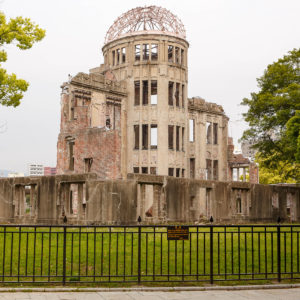This weekend will be an extraordinary moment in American history. On Friday, Barack Obama will become the first sitting American president to visit Hiroshima, Japan, since its destruction by a U.S. atomic bomb in 1945. And although he has made it clear that no apology for the bomb will be forthcoming, his visit will make history.
May 30 is Memorial Day, a time to honor American soldiers who died in combat.
To me it’s not just a time to remember the dead but to pay homage to living veterans, many of whom have spent their postwar years suffering from post-traumatic stress disorder and other mental health issues.
According to a recent study by the PTSD Foundation of America, one in three American veterans has PTSD, but only 40 percent of those afflicted seek help. People who suffer from PTSD often relive their traumatic experiences through nightmares and flashbacks, have difficulty sleeping and feel detached or estranged. These symptoms can be so severe that they significantly impair the person’s daily life.
One of three homeless people is a veteran, according to the study. Veterans’ suicide rate is 41 percent higher than the national average. Despite extensive media coverage, our nation’s handling of our veterans’ mental health issues never seems to improve.
Obama’s decision to visit Hiroshima is probably one of the most meaningful decisions he has made as president. But then again, Hiroshima’s fate is close to my heart.
My stepdad, Nikolay Palchikoff, was born and raised in Hiroshima, the son of Russian nobility who moved there after the czar’s army lost in the Russian Revolution in 1917. He wasn’t living at home in the summer of 1945, when the Enola Gay dropped an atomic bomb on Hiroshima, killing more than 200,000 Japanese people and foreigners. A month later, he returned to pay tribute to his parents and siblings.
His arrival at his hometown was unique. His parents had sent him to California when he was 16 — in 1940, before the war started — to get an American education. After Japan bombed Pearl Harbor one year later, when he turned 18 he enlisted in the Army to join the fight against his homeland, which he saw as the enemy.
Because he was a native Japanese speaker but was ethnically white, he became an officer for the Army Intelligence Service, charged with interrogating Japanese POWs and cracking Japanese military radio codes.
And it was on Japanese radio that he heard a chemical bomb had destroyed Hiroshima at 8:15 a.m. Aug. 6, 1945. He assumed his family was dead.
The Army sent him to Hiroshima a month later to assess the damage, as there was much to learn about the power of the bomb. It gave him the chance to pay his last respects.
His family miraculously survived, having just days prior moved to the outskirts of the city. They even escaped radiation poisoning, which condemned others to a longer, more painful death. For years my stepfather tried to put the horrifying visions out of his mind. Like many in the military, he convinced himself that the bomb had saved American lives.
But still haunted 40 years later by what he had seen, he began gathering signatures for a U.N. resolution to ban nuclear weapons worldwide. In addition to his worldwide travels, he would drive to the Nevada National Security Site, joining hundreds of peace activists in protesting the underground testing of nuclear bombs. Over the years he collected more than 100,000 signatures, while sharing his personal stories about the realities of nuclear weapons.
Growing up, I listened to many of his stories at the dinner table. He cried a lot. Many of his speeches and media interviews were likewise traumatic. Every time, he relived the Hiroshima tragedy. Often, he couldn’t finish the speeches because his words turned into tears. As he wrote in The New York Times, “There were no birds. No people. No buildings. No trees. No life. Outlines of human bodies burned like negatives in cement. The house I had grown up in was gone. The city had vaporized.”
World War II ended 71 years ago, and there are relatively few veterans alive who remember it. My stepfather died in August 2003. Were he here today, I’m sure he would be encouraged by Obama’s efforts to bring attention to the cause of global disarmament when he visits the world’s first ground zero. His visit will be a monumental step toward bringing a sense of closure to a horrific wartime act, something my stepfather never got.
Many veterans alive today are looking for closure as well. This coming Memorial Day weekend, let’s remember our nation’s soldiers, alive and dead, from all wars, including the continuing conflict in the Middle East, who in addition to putting their lives on the line for our nation are too often left alone to deal with the mental trauma of their wartime memories that often never go away.
They truly have served their country.

